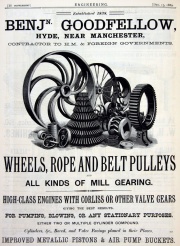Featured Article: Steam Engine & Boiler House
Steam Power came comparatively late to Mellor Mill, in comparison with a majority of large cotton mills. Quarry Bank Mill built in 1784, had Boulton & Watt steam engines in 1810, however the nearby Torr Vale Mill had itself survived until 1856, when being re-built, without a steam engine.
In 1860 two steam engines and boilers were installed by Benjamin Goodfellow, well-known Hyde engineer. Goodfellow supplied the engines to power the London sewage system in 1895, replacing those of James Watt & Co.
Boilers and engines were enclosed in a new building at the northern end of the main mill building. The installation of the event was of such note that, following a successful trial run of the system, the company saw fit to have an evening celebration dinner at the Navigation Inn.
The following video was produced by Chris Mann of Manmade Productions,who has made several videos for MAT,and features Bob Humphrey-Taylor, Rachel Miller, our volunteer archaeologist, and Dr. John Glithero.
From the Stockport Advertiser 14th. September 1860
Marple News
On Friday evening last, a very liberal repast was prepared at the house of Mr. George Swain, The Navigation Inn, Marple, for the managers the overlookers, and a number of employés belonging to the cotton-spinning establishment of Peter Arkwright, Esq of Mellor, on the occasion of the erection of two new engines, boilers and large chimney, on the premises. It is somewhat remarkable that this model factory has been turned by a large and well-constructed water wheel, supplied by an extensive reservoir on the premises, and from the River Goyt. Owing, however, to the drought that has prevailed for the last two or three years, that vast spinning establishment could not be carried on so regularly and as heretofore, and hence the necessary for providing additional moving power, which has now been successfully and satisfactorily completed by and under the direction of, Mr. Benjamin Goodfellow, of Hyde. On testing the engines which gave unqualified satisfaction, the above mentioned “spread”, was given, which reflected much credit upon the caterers. After the cloth was down, Mr. Wheeldon, the manager was called upon to preside, when the songs, toasts, recitals’ followed each other, and the evening passed most pleasantly –Miss Swain presiding at the piano-forte, and singing several favourite songs, and joining in with her brother, Master Charles Swain, in some choice duels.
Source: Stockport Advertiser
14th Sept 1860:P.2 Col.7
sources:
